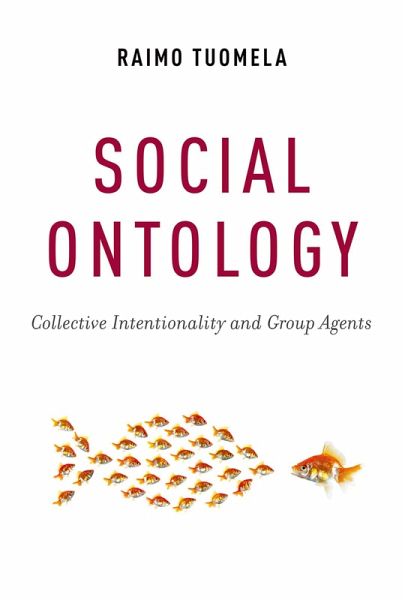
Social Ontology (eBook, PDF)
Collective Intentionality and Group Agents

PAYBACK Punkte
11 °P sammeln!
Social ontology, in its broadest sense, is the study of the nature of social reality, including collective intentions and agency. The starting point of Tuomela's account of collective intentionality is the distinction between thinking and acting as a private person ("I-mode") versus as a "we-thinking" group member ("we-mode"). The we-mode approach is based on social groups consisting of persons, which may range from simple task groups consisting of a few persons to corporations and even to political states. Tuomela extends the we-mode notion to cover groups controlled by external authority. Th...
Social ontology, in its broadest sense, is the study of the nature of social reality, including collective intentions and agency. The starting point of Tuomela's account of collective intentionality is the distinction between thinking and acting as a private person ("I-mode") versus as a "we-thinking" group member ("we-mode"). The we-mode approach is based on social groups consisting of persons, which may range from simple task groups consisting of a few persons to corporations and even to political states. Tuomela extends the we-mode notion to cover groups controlled by external authority. Thus, for instance, cooperation and attitude formation are studied in cases where the participants are governed "from above" as in many corporations. The volume goes on to present a systematic philosophical theory related to the collectivism-versus-individualism debate in the social sciences. A weak version of collectivism (the "we-mode" approach) depends on group-based collective intentionality. We-mode collective intentionality is not individualistically reducible and is needed to complement individualistic accounts in social scientific theorizing. The we-mode approach is used in the book to account for collective intention and action, cooperation, group attitudes, and social practices and institutions, as well as group solidarity. Tuomela establishes the first complete theory of group reasons (in the sense of members' reasons for participation in group activities). The book argues in terms of game-theoretical group-reasoning that the kind of weak collectivism that the we-mode approach involves is both conceptually and rational-functionally different from what an individualistic approach ("pro-group I-mode" approach) entails.
Dieser Download kann aus rechtlichen Gründen nur mit Rechnungsadresse in A, B, BG, CY, CZ, D, DK, EW, E, FIN, F, GR, HR, H, IRL, I, LT, L, LR, M, NL, PL, P, R, S, SLO, SK ausgeliefert werden.













